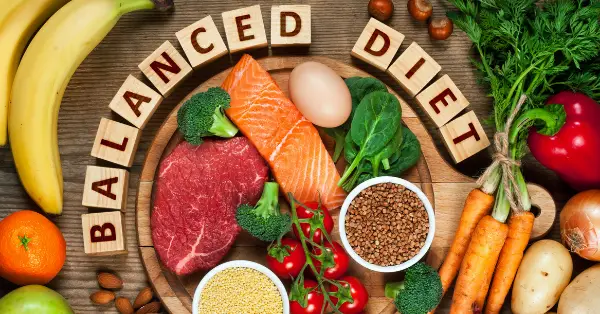Eating a balanced diet is one of the most important things you can do for your overall health and well-being. A balanced diet not only ensures that you get all the essential nutrients, vitamins and minerals required for optimal body functioning, but it can also help prevent various illnesses and diseases. Eating a healthy diet helps maintain a healthy weight, can reduce your risk of chronic diseases such as diabetes and heart disease, and can even improve your mood.
Balanced Diet and Health
Eating a balanced diet is essential for maintaining good health. Eating a variety of foods in the right proportions can help to ensure that your body gets all the nutrients it needs to stay healthy and functioning properly. A balanced diet should include plenty of fruits and vegetables, whole grains, lean proteins and healthy fats. Eating a well-balanced diet provides you with energy, helps you maintain a healthy weight, boosts your immune system and reduces your risk of developing chronic diseases such as heart disease or cancer.
In addition to eating a balanced diet, getting regular physical activity is also important for maintaining good health. Exercise can help improve blood circulation and lower cholesterol levels, reducing the risk of stroke or heart attack. It also strengthens bones and muscles, improves balance and coordination, relieves stress and promotes better sleep habits. Regular exercise can help reduce the risk of obesity-related illnesses such as type 2 diabetes by burning excess calories from fat storage in the body. Finally, physical activity releases endorphins which promote feelings of happiness and wellbeing which can have positive effects on mental health too.
Macronutrients: Carbohydrates, Proteins, Fats
Carbohydrates are an important source of energy for the body, and are necessary to maintain a healthy diet. They provide fuel for the central nervous system, help regulate blood sugar levels, and are important in digestion. Complex carbohydrates such as whole grains, legumes, and starchy vegetables should be included in most meals. Eating a variety of these foods can help ensure your body gets enough fiber, vitamins, and minerals needed for good health.
Proteins are necessary for growth and repair of tissues throughout the body. It is also important to consume adequate amounts of proteins from sources such as lean meats, fish, eggs, dairy products or legumes. Eating high quality sources of protein can help build muscle mass which is essential for maintaining strong bones and muscles.
Fats play an important role in hormone production as well as cell membrane structure. Unsaturated fats found in nuts, seeds or avocados should be consumed on a regular basis alongside heart-healthy monounsaturated fats found in olive oil or avocado oil to ensure you get all the essential fatty acids your body needs.
Micronutrients: Vitamins and Minerals
Vitamins and minerals are micronutrients that are essential for human health. They play an important role in many bodily functions, from the metabolism of carbohydrates and fats to the formation of hormones and neurotransmitters. Vitamins are organic compounds that cannot be synthesized by our bodies, so they must be acquired through diet or supplements. Minerals are inorganic nutrients that also need to be ingested as part of a balanced diet.
The vitamins required for good health include A, B complex (thiamine, riboflavin, niacin, folate, pantothenic acid), C, D, E and K. These vitamins help maintain healthy skin and eyesight; facilitate cell growth; regulate hormones; aid in tissue repair; and support immune system function among other benefits.
Minerals such as calcium, magnesium, phosphorus and zinc can also help promote strong bones; regulate fluid balance in the body; support metabolic processes like energy production; enable muscle contractions; ensure proper nerve transmission; boost immunity levels against disease-causing agents among other essential roles they play in maintaining good health. Together with proteins, carbohydrates and fats they form an integral part of a balanced diet which is necessary for optimal physical functioning.
Benefits of Balanced Diet
A balanced diet is a dietary pattern that includes all the essential nutrients, vitamins, minerals and energy needed for proper growth and development. Eating a balanced diet helps you maintain good overall health and also prevents chronic diseases like heart disease, diabetes and cancer. It is important to include a wide variety of foods from all the food groups in your daily meals as each of them contains different nutrient profiles which are necessary for optimal health.
Eating a balanced diet can help improve your energy levels throughout the day and can also aid in weight management by controlling calorie intake. It ensures you get enough protein for muscle recovery after physical activities, carbohydrates for energy production during long duration activities, fats for hormone synthesis and essential fatty acids to boost metabolism. Eating plenty of fruits and vegetables provides fiber which helps regulate digestion, reduces cholesterol levels in blood, lowers risk of stroke or heart attack by preventing plaque buildup on arteries walls. Fiber also keeps you feeling full longer hence it may be helpful if you’re trying to lose weight or maintain healthy body mass index (BMI). A balanced diet plays an important role in improving mental health as well since it boosts mood-regulating hormones like serotonin while providing the vitamins and minerals needed to support cognitive function.
